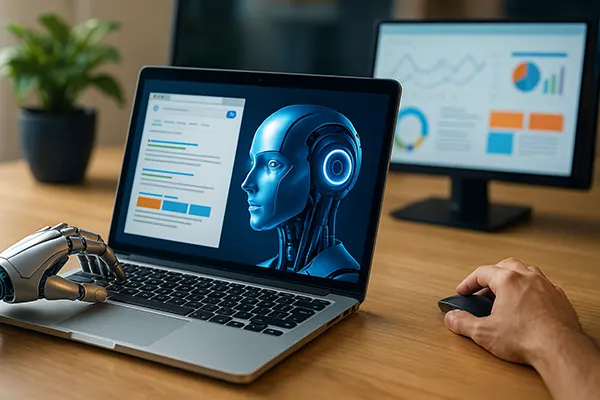
AI-SEO 2025: How Artificial Intelligence Transforms Content Creation, Website Structure, and Search Visibility
Artificial intelligence is no longer just a supporting tool in digital marketing—it is now a central driver of innovation in SEO. As of mid-2025, AI-SEO has become a crucial element for content creators, web developers, and SEO professionals seeking to stay relevant in a competitive digital ecosystem. This article explores how AI changes the way content is generated, how websites are structured, and how results are ranked on search engines.
AI and the Transformation of Content Creation
AI has revolutionised content creation, making it faster, more scalable, and tailored to user intent. Tools like ChatGPT, Jasper, and Writesonic now assist writers not only in drafting texts but also in understanding tone, target audience, and SEO alignment. However, the key to their effective use is human supervision and value-driven enhancement.
In 2025, the most successful content strategies rely on a hybrid approach: AI for drafts and data analysis, and human experts for final editorial integrity and trust. Google’s evolving algorithms reward content that shows Experience, Expertise, Authoritativeness and Trust (E-E-A-T), which AI alone cannot fully emulate without human refinement.
Another important aspect is the ability to generate unique angles based on real-world expertise. For example, healthcare or finance articles must reflect demonstrable author credentials and trustworthy sourcing—something AI-generated content must be guided to comply with.
Editorial Standards in the Age of AI
Writers must now be editors, curators, and validators of AI-generated content. Ensuring fact-checking, eliminating bias, and integrating first-hand insights are vital. Google assesses whether a human has added meaningful value to the content.
Ethical practices are also under scrutiny. Using AI to manipulate rankings without offering genuine value may result in penalties under Google’s spam policies. Transparency in how content is created—especially disclosing AI use where necessary—is becoming standard in responsible publishing.
Ultimately, AI should enhance editorial workflows without replacing human judgement. Content that prioritises the user experience and answers specific needs remains at the core of SEO success.
How AI Redefines Website Structure and Technical SEO
Artificial intelligence impacts more than just copy—it reshapes site architecture and user experience. In 2025, AI-based SEO tools analyse behavioural data to recommend changes in layout, menu structure, and internal linking strategies that better serve users and search engines alike.
Dynamic rendering, predictive navigation, and real-time content customisation are just a few features made possible through AI. Websites are increasingly adaptive, offering tailored experiences based on user patterns, device types, and geolocation.
Moreover, AI assists in eliminating technical debt. From automated site audits to structured data implementation, tools like Screaming Frog with integrated ML capabilities help webmasters prioritise and fix issues quickly, improving crawlability and indexing quality.
Semantic Structuring and AI
Semantic SEO is now inseparable from AI. By understanding entities, relationships, and search intent, AI tools help structure content and metadata for clearer contextual understanding by search engines.
Knowledge graphs, schema markup, and internal topic clusters are refined through natural language processing. This leads to better feature snippet inclusion, improved FAQ targeting, and stronger topical authority.
AI also contributes to predictive site structuring—anticipating what pages may need to exist based on growing keyword trends and user queries, helping future-proof website taxonomies.

Impact of AI on Search Engine Rankings and Visibility
Google’s Search Generative Experience (SGE), rolling out globally in 2025, marks a significant shift. Instead of traditional blue links, users see AI-generated summaries, meaning only the most authoritative sources are referenced. This prioritises helpful content with strong E-E-A-T signals.
Websites that aim to gain visibility must therefore align with structured, fact-based, and user-first content models. AI can assist by evaluating competitor content, highlighting gaps, and generating outline strategies, but it cannot fabricate trust or authority.
New ranking factors such as author identity, originality of research, and contextual depth are becoming measurable. The visibility battle is no longer just about backlinks and keywords—it is about being a credible, experience-based resource in your domain.
The Role of AI in SERP Features
AI-SEO tools now optimise content for specific SERP features such as People Also Ask, video carousels, and featured snippets. They analyse formatting, language patterns, and engagement metrics to increase the chances of being selected by Google’s AI systems.
However, SEO professionals must continually update their understanding of how SGE impacts traffic flows. Visibility in AI snapshots may not always translate to clicks, making it essential to create compelling reasons for users to visit the source.
Ultimately, AI is a tool—not a guarantee. Success depends on how well the content serves human readers. High-quality pages with clear value propositions, factual accuracy, and transparency are those that rank and convert best in the AI-dominated SERPs of 2025.
